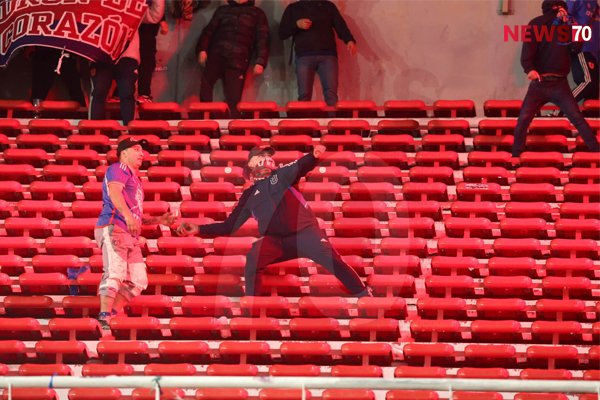A Copa Sudamericana last-16 match between Universidad de Chile and Independiente in Buenos Aires was abandoned after violent clashes in the stands left 19 Chilean supporters hospitalized. Universidad de Chile accused Independiente and Argentine authorities of failing to protect their fans, alleging home supporters stormed the visiting section, attacked the team bus, and attempted to enter the away dressing room. Independiente blamed the violence on visiting fans, claiming they damaged stadium facilities and launched fireworks, calling the retaliatory attacks “unacceptable” but insisting safety protocols were followed. The club vowed to ban violent individuals and seek compensation for damages, stating “violence does not define us.” FIFA president Gianni Infantino condemned the incidents as “barbaric,” urging authorities to hold perpetrators accountable, while CONMEBOL cited a “lack of security guarantees” as the reason for abandoning the match. Buenos Aires security officials acknowledged delays in response amid a “hostile attitude” at the stadium.
Universidad de Chile has accused Independiente and Argentine authorities of failing to protect their fans from a “brutal and inhuman attack” that left 19 supporters hospitalized.
The Copa Sudamericana last-16 tie in Buenos Aires was abandoned after violent clashes erupted in the stands. Trouble began at halftime when objects, including a stun grenade, were thrown from the away section onto home fans. Violence escalated in the second half as home supporters stormed the visiting section, forcing Chilean fans to flee.
The Chilean club reported that 16 of the 19 hospitalized supporters have been discharged, while one fan remains in intensive care after surgery for a skull fracture, though their condition has “significantly improved.”
Universidad de Chile described the night as “one of the most violent episodes in football history,” alleging that Independiente fans moved freely into the visiting section and carried out “extremely violent and inhuman acts.”
The club also claimed that attackers attempted to enter the away team’s dressing room, smashed bus windows, and despite around 100 Chilean supporters being arrested, “not a single attacker” from the home side faced detention.
Argentine club Independiente responded to the accusations, asserting that the trouble started in the away section before kickoff, with visiting fans attacking and disabling the stadium’s CCTV system.
They claimed that the Chilean supporters “destroyed restroom facilities” and “launched fireworks” at home fans, prompting what they described as “unacceptable retaliatory attacks.”
Independiente denied any failure in following safety protocols, emphasizing that all necessary measures were taken but “were insufficient to contain the excessive violence.”
The club vowed to ban the “criminals disguised as fans” who responded violently and said they would seek compensation for the damage caused to their facilities.
They concluded their statement by declaring: “Violence does not define us.”
FIFA president Gianni Infantino condemned the violent incidents, calling them “barbaric” and urging local authorities to hold those responsible accountable.
“Violence has no place in football. Players, fans, staff, officials, and everyone who loves the game should be able to enjoy it without fear,” Infantino wrote on Instagram. He added that his thoughts were with the innocent victims affected by the attacks.
CONMEBOL, which oversees South American tournaments and decided to abandon the match, cited a “lack of security guarantees from the local club and authorities” as the reason for cancellation.
Buenos Aires provincial security minister Javier Alonso criticized the delay in the decision, noting that it was “clear there was a very hostile attitude.”
